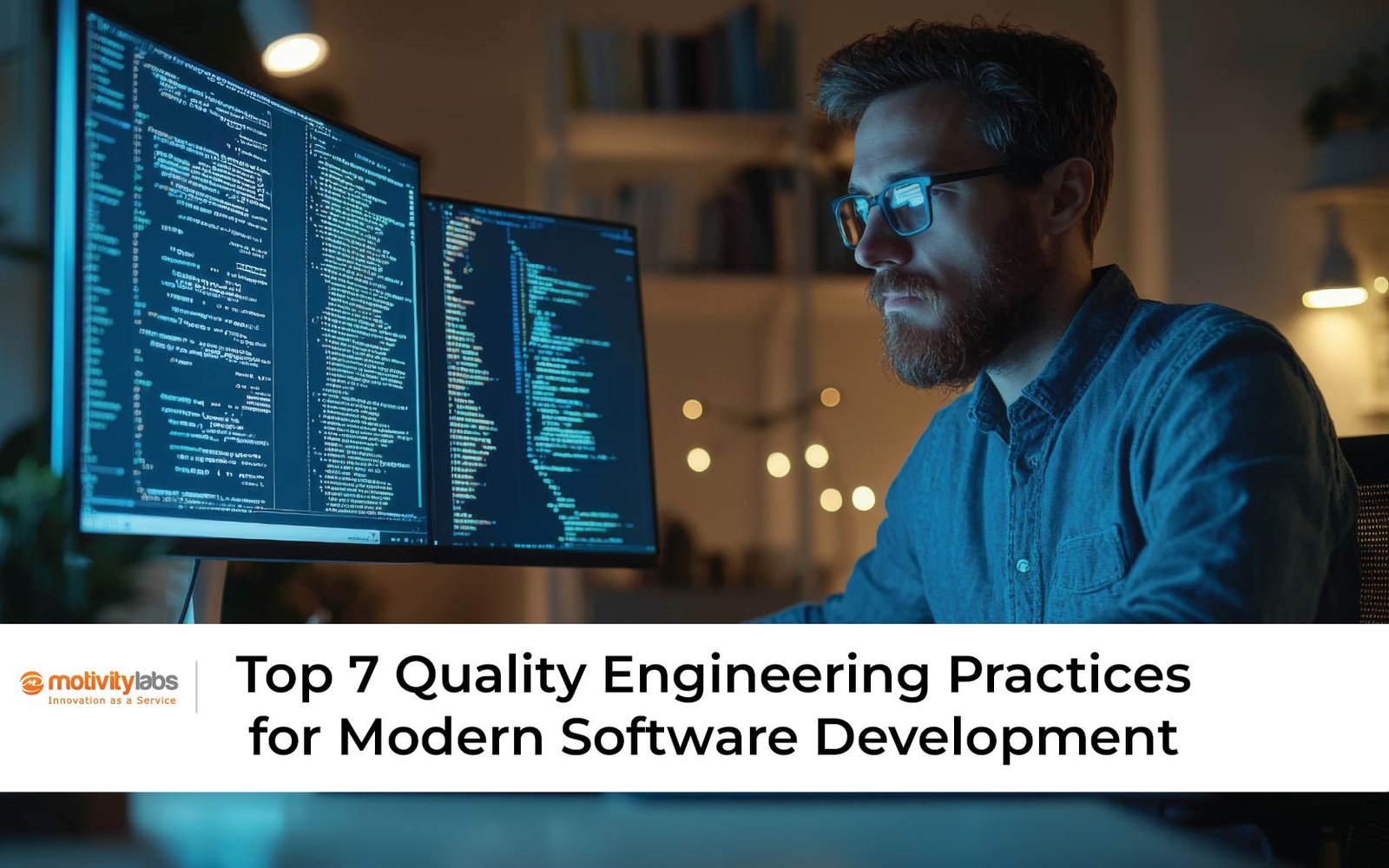To succeed in the dynamic and highly competitive hospitality industry, meeting and going beyond client needs is vital, as well as leveraging best-in-class hospitality IT services to deliver exceptional customer experiences. Whether it is a high-end holiday resort, a tiny B&B, a bustling eatery, an elite function facility, or an exciting ocean liner cruise ship, every guest interaction must be carefully planned, created, and delivered with unwavering attention to quality and customer satisfaction. That’s where Quality Engineering (QE) comes into play; all products, services, and processes across different domains of hospitality IT services must comply with best-in-class standards to produce outstanding customer service at each step.
What is Quality Engineering in Hospitality?
Quality engineering within the hospitality industry covers numerous practices and methodologies aimed at achieving guest satisfaction in all areas. It involves systematic efforts towards identifying, measuring and improving quality of products/services/processes across various sectors such as hotels, lodges, restaurants, cruise lines and event venues. From designing guest rooms and public spaces to developing digital platforms including mobile apps among others are key considerations when applying quality engineering principles with an aim of providing seamless enjoyable experience for consumers.
Role of Quality Assurance in the Hospitality Industry
The industry relies heavily on quality assurance in hospitality practices. Such a process continuously supervises, tests and appraises products, services and operations with a view to preventing potential problems or deficiencies impacting on customer service in the hospitality industry. The QA practices also help ensure that guest rooms are cleaned and maintained for their functionality, restaurant kitchens adhere to food safety requirements strictly and usability of digital platforms is well-tested together with their performance.
How the Hospitality Industry Enhances Customer Service through Technology?
The sector has deeply embraced technology as part of its daily operations making quality engineering critical in ensuring that solutions deliver excellent customer service. For instance, quality engineering ensures rigorous hospitality app testing meant to streamline check-in and check-out processes; and AI-powered Chabot’s which provide personalized recommendations, are dependable, user-friendly and meet customers’ needs.
What Are the Most Commonly Used Trends & Technologies In Hospitality?
The hospitality industry is a driving force for change that embraces new trends as well as technologies in enhancing customer service. Some of the most commonly used trends and technologies are highlighted below:
- Artificial Intelligence (AI) and Machine Learning for personalized recommendations
- Internet of Things (IoT) in smart room controls, energy management, and asset tracking
- VR and AR for immersive marketing, virtual tours, and interactive menus.
- Robotics to improve housekeeping operations, concierge services, and restaurant automation.
- Biometrics for better security and customized experiences
These trends and technologies can be implemented seamlessly across various sectors within the hospitality industry with the help of quality engineering that ensures reliable and consistent guest experience.
Importance of Information Technology in Hospitality Industry
Hotels, restaurants, events venues and cruise lines have had a total revolution in the hospitality industry through information technology (IT). IT solutions are extremely important for such businesses as property management systems help to optimize room inventory and pricing while point of sale systems make transactions more efficient.
Examples of Hospitality IT Services
The hospitality industry relies heavily on Information Technology (IT) to streamline operations and enhance customer experiences. Without IT, managing daily operations in hotels, restaurants, and other hospitality businesses would be nearly impossible. Let’s dive into some key IT applications in this industry.
Hotel Management Software Hotel Management Software (HMS) is essential for overseeing various hotel functions, from room bookings to guest check-ins and billing. Popular HMS platforms like Opera PMS and Cloud beds centralize operations, making it easier for staff to deliver exceptional service.
Booking Systems Booking systems play a crucial role in managing reservations, allowing guests to check room availability and book online with ease. These systems often integrate with HMS and CRM software, ensuring guest data is consistently updated and accessible.
Customer Relationship Management (CRM) Software CRM software helps hospitality businesses understand and serve their customers better. By collecting and analyzing data from multiple touchpoints, CRM systems enable personalized guest experiences, which can lead to higher satisfaction and loyalty.
Point Of Sale (POS) Systems POS systems are vital for efficient transaction processing in restaurants and hotel outlets. They manage sales, track inventory, and provide insightful sales data, helping businesses optimize operations and improve service delivery.
Online Reservation Systems Online reservation systems offer convenience, allowing customers to book services from anywhere in the world. Platforms like Booking.com and Expedia make it easy for travelers to find and reserve accommodations quickly and efficiently.
Restaurant Inventory Management Systems These systems help track and manage stock levels in restaurants, reducing waste and optimizing orders. Accurate inventory management ensures that restaurants always have the necessary ingredients on hand, enhancing operational efficiency and reducing costs.
Digital Signage Digital signage engages customers with dynamic content such as promotions, menus, and event information. In hospitality settings, digital signage can enhance the customer experience by providing timely and relevant information.
Automated Customer Service Systems Automated systems, including Chabot’s and AI-driven interactions, streamline customer service by handling common inquiries. This allows staff to focus on more complex tasks, improving overall efficiency and response times.
IT Infrastructure Components Beyond software, IT in hospitality also includes crucial infrastructure components like networking hardware, servers, and security solutions. These components ensure that hospitality businesses run smoothly, securely, and efficiently.
Benefits of IT in Hospitality
- Improved Customer Service: Personalized experiences and efficient service.
- Streamlined Processes: Easier bookings, check-ins, and check-outs.
- Accurate Data Management: Enhanced analytics and decision-making.
- Better Communication: Seamless interaction between staff and guests.
- Increased Productivity: Automation reduces manual tasks.
How Can Information Technology be Used to Improve Customer Experience?
Various ways in which information technology can enhance customer service in the hospitality industry include:
- Mobile apps and online portals that aid in seamless booking, check-in/out and personalized services
- AI-powered chatbots and virtual concierges for 24/7 assistance and personalized recommendations
- Smart room controls and IoT solutions for enhanced comfort and convenience
- Big data analytics to understand customer preferences ad tailor experiences
By adhering to quality assurance in hospitality principles; Hospitality businesses can ensure that their IT solutions are reliable, secure, user-friendly thus ultimately leading to exceptional customer service across the field.
Challenges and Solutions in Implementing Quality Engineering
The benefits of quality engineering in the hospitality industry are great, however, it is not free from challenges. Some of the most frequent impediments include:
Objection to Change The difficulty of getting used to fresh processes and methodologies might be hard, particularly in stable companies. Explaining clearly, providing training, and showing the advantages of QE can help lessen this objection.
Limited Resources The application of QE methods may need more resources like skilled staff, training, and equipment. Leveraging hospitality IT services from external experts can help address resource constraints.
Data Silos In the hospitality industry, data can reside across many systems. This makes it hard to get a full picture of the guest experience. When we consolidate the data sources and use robust analytics, these silos can be broken down.
Complexity of Guest Experiences The experiences of guests involve numerous touchpoints and interactions, making it possible to identify and address all potential issues. Applying methods such as guest journey mapping, segmentation, and personalization can assist in managing this complexity.
What Motivity Labs Offers in Hospitality IT Services

Motivity labs is one of the leading providers of high-quality engineering services. It specializes in helping hospitality businesses provide excellent experiences to their customers through dependable and superior hospitality software solutions. Through utilization of state of the art tools and methods, our experienced team of QA professionals guarantees that your digital platforms, mobile apps and IT systems meet the highest levels of quality, security, and performance.
Motivity Labs offers complete quality assurance in hospitality support from end-to-end QA services for mobile apps & websites to rigorous hospitality app testing for property management systems, point-of-sale solutions and guest-facing technologies. Our expertise covers several domains including functional testing, usability testing, performance testing, security testing and automation ensuring that your hospitality software solutions are thoroughly validated & optimized for exceptional performance.
By partnering with Motivity Labs, we provide you the best chance to leverage our vast experience in hospitality IT services and ensure that your hospitality software solutions are dependable, user-friendly, and compliant with the best industry practices. By assuring quality assurance in hospitality services, we will help you build brand loyalty and become more competitive in this changing landscape of hotels, resorts, restaurants, cruise lines and event venues.
Exceptional experiences are vital for success in today’s highly competitive hospitality market. Quality engineering is very important as it ensures each aspect of a guest journey from booking to check-out is seamless, reliable and meets their expectations. By adopting rigorous quality assurance in hospitality practices supported by emerging technologies and engaging experienced hospitality IT services providers such as Motivity Labs, businesses can improve customer service in the hospitality industry, thus becoming more loyal to brands by giving them a cutting edge.



